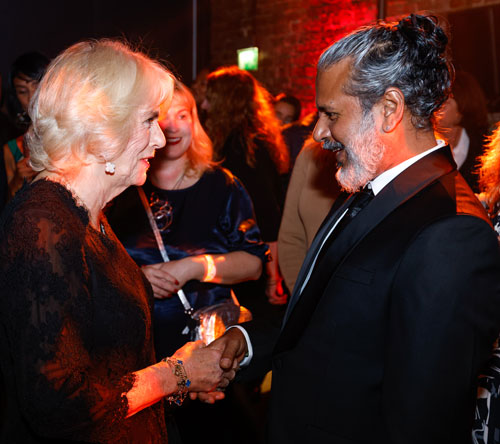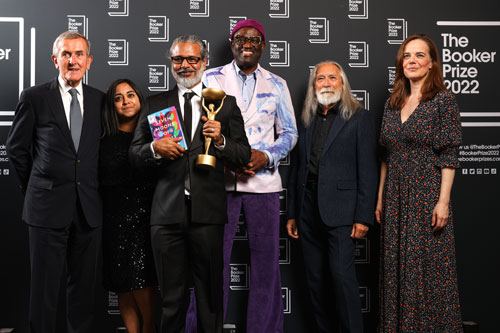A Booker chat with Shehan

Britain’s Queen Consort meets Shehan Karunatilaka at the Booker Prize 2022 ceremony at the Roundhouse.
Sri Lankan writer Shehan Karunatilaka has won the Booker Prize 2022, one of the most prestigious literary prizes in the world, for his second novel The Seven Moons of Maali Almeida.
Shehan received the award from Britain’s Queen Consort Camilla at an awards ceremony in London on Monday. Pop singer Dua Lipa was the star guest.
“My hope for Seven Moons is this: that, in the not-too-distant future – ten years, or as long as it takes – that it is read in a Sri Lanka that has understood that these ideas of corruption and race-baiting and cronyism have not worked and will never work. And that it is read in a Sri Lanka […] that learns from its stories and that Seven Moons will be in the fantasy section of the bookshop, next to the dragons and the unicorns, and will not be mistaken for realism or political satire,” he said in his acceptance speech, concluding the speech in Sinhala and Tamil. In his speech, he also drew attention to the journalists, activists, civilians and politicians murdered by the Sri Lankan state or by those opposing it.
The Seven Moons of Maali Almeida is published in the UK by independent publisher Sort Of Books. A previous version of the novel was originally published in India in 2020 with the title Chats with the Dead. In an email interview with this newspaper in July, Shehan explained that it was the same story, “with roughly the same characters, but with a few subplots revised. The new version is perhaps tighter, pacier, more textured and nuanced, and hopefully more accessible to a wider audience.” Written in the second person and set in 1989 in Colombo, the novel tells the story of Maali Almeida, a war photographer and gambler who wakes up and finds that he is dead, with no idea who killed him. He has seven days to solve the mystery of his murder and uncover a cache of explosive photographs.

Unanimous decision: Shehan Karunatilaka, winner of the Booker Prize 2022 with judges L-R Neil MacGregor (chair), Shahidha Bari, Alain Mabanckou, M John Harrison and Helen Castor. Pix courtesy Booker Prize Foundation
“What the judges particularly admired and enjoyed in The Seven Moons of Maali Almeida was the ambition of its scope, and the hilarious audacity of its narrative techniques. This is a metaphysical thriller, an afterlife noir that dissolves the boundaries not just of different genres, but of life and death, body and spirit, east and west,” commented Neil MacGregor, Chair of the 2022 judges.
Born in 1975 in Galle, Sri Lanka, Shehan grew up in Colombo, studied in New Zealand and lived and worked in London, Amsterdam and Singapore. He currently lives in Sri Lanka and has worked as an advertising copywriter. He has published two novels and three children’s books. His debut novel Chinaman: The Legend of Pradeep Mathew was the winner of the 2012 Commonwealth Book Prize, the DSC Prize for South Asian literature and the Gratiaen Prize. A short story collection, The Birth Lottery and other Surprises, is out this year published by Hachette India and will be published in 2023 by Little, Brown UK.
 Shehan is the second Sri Lanka-born writer to be awarded the Booker prize. Michael Ondaatje’s The English Patient was a joint winner of the Booker Prize in 1992 and the Golden Booker in 2018 while Anuk Arudpragasam’s A Passage North was shortlisted for the 2021 Booker Prize last year as was Romesh Gunesekera’s Reef in 1994.
Shehan is the second Sri Lanka-born writer to be awarded the Booker prize. Michael Ondaatje’s The English Patient was a joint winner of the Booker Prize in 1992 and the Golden Booker in 2018 while Anuk Arudpragasam’s A Passage North was shortlisted for the 2021 Booker Prize last year as was Romesh Gunesekera’s Reef in 1994.
The £50,000 prize is awarded annually for the best work of fiction published in the UK in English. Past winners have included writers such as Arundhati Roy, V.S. Naipaul, Kazuo Ishiguro, Salman Rushdie, Margaret Atwood, Hilary Mantel and Ben Okri.
The Sunday Times caught up with Shehan over email to discuss his win.
Q: Congratulations on your win, Shehan. 50,000 pounds. What is the most wildly irrational purchase you’re going to make with it?
I spend money on the same things I spent pocket money on as a teenager. Books, music, movies, gadgets. But I bought a drum kit just before I left for the Booker, my headphones work fine and I already have too many guitars. I think I’ve done my irrational purchases for the year. I’ll probably buy a ton of books and a few records, but the rest I hope to invest sensibly for my children.
Q: In your speech at the Booker Prize ceremony, you highlighted the deaths of journalists, activists and civilians and corruption, race-baiting and cronyism in Sri Lanka. After your win, the president’s media division, politicians and MPs took to twitter to congratulate you – many of them were or currently are part of the systems of violence you reference. What was your reaction at seeing these messages? Do you think they’ve read the book?
I haven’t been able to keep up with the volumes of texts and tweets that have come my way. Most of our politicians don’t come across as great readers, though I hope I’m wrong about this. I’ve never really participated in social media, and don’t see any reason to start now. I’m always delighted to accept congratulations from anyone. But I’ll let the comments sections respond on my behalf.
How did you grapple with these questions when writing and collecting material for the book?
I think you’re asking if a cishet Sinhala Buddhist man living in Colombo can write about wars in Jaffna or about gay men or about the suffering of other ethnicities. I think if the writer researches thoroughly, writes honestly, and does it with respect and empathy, then yes I think you can.
Q: In your speech, you spoke about personal support systems and creative communities that helped shape the book. How important have these been for you in your writing practice?
Vital. You’re stuck in a room for years on end, reading to yourself and having conversations with ghosts. You’re never sure if it’s working or if anyone else will read it. So it’s vital to have friendly folk around to encourage you, keep you sane and gently tell you when the writing’s no good.
Q: What was the best part of the Booker experience in the past months?
Reading the longlist and meeting the shortlist. Such wonderful writers and such clever books. I haven’t finished any of them yet, but the ones I’ve started on are spectacular, especially Percival Everett’s The Trees and Elizabeth Stroud’s Oh William!
But just the experience of meeting readers and chatting to them has been life-changing. I spent so much time alone with this story, it’s good to see it out in the world.
Q: In recent years – with the exception of a few – many Sri Lankans writing in English and who have achieved a degree of literary success and international recognition, are largely based out of the country. Creative and publishing industries in Sri Lanka are small and are also affected by the ongoing crisis. What advice do you have for writers based in Sri Lanka, writing in English?
Why just in English? Sri Lanka is filled with so many stories, conflicts and absurdities that we should be telling our stories in whichever of our three languages we choose. I’d like to see more books in translation, so we can all read each other’s stories.
For Sri Lankan writers, I’d say find the story that moves you and that no one else can tell. And then make time and space in your life to read and write every day. If you spend an hour writing every day, in 12 months you’ll have something. It may not be good, but it will be something you can build on. Be patient. Be kind with yourself and ruthless with the work. But please keep writing, there are so many Sri Lankan stories to tell.
Searching for an ideal partner? Find your soul mate on Hitad.lk, Sri Lanka's favourite marriage proposals page. With Hitad.lk matrimonial advertisements you have access to thousands of ads from potential suitors who are looking for someone just like you.


